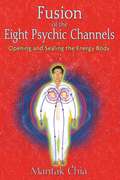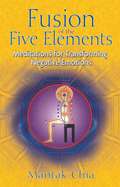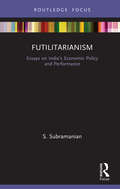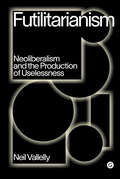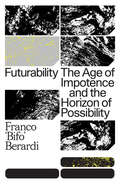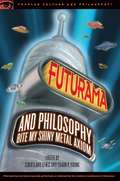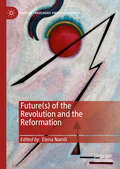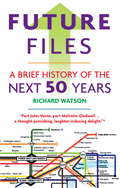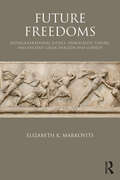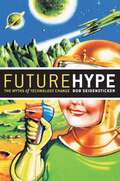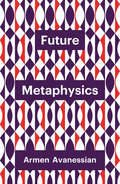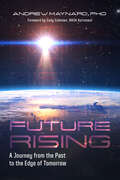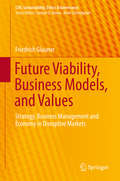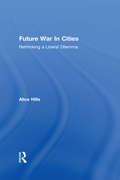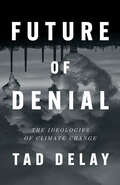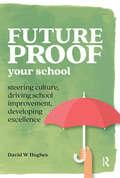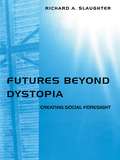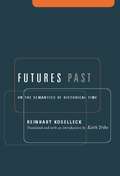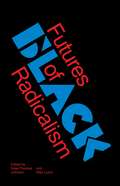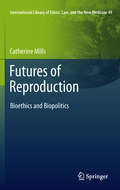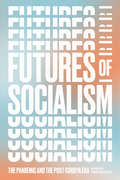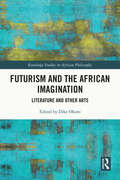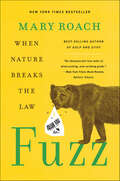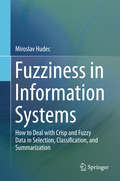- Table View
- List View
Fusion of the Eight Psychic Channels: Opening and Sealing the Energy Body
by Mantak ChiaAdvanced Inner Alchemy exercises that promote the free flow of energy throughout the body in preparation for the Practice of the Immortal Tao• Explains how to open the Great Bridge Channel and the Great Regulator Channel• Includes exercises to strengthen and wrap the spinal cord with energy• Reveals how to create a thicker aura to protect the body and receive the higher frequencies of the Universal ForceThe Fusion of the Eight Psychic Channels practice builds upon the Fusion of the Five Elements and Cosmic Fusion practices and is the final step in preparation for the Practice of the Immortal Tao. Master Mantak Chia shows how to open the Great Bridge Channel and the Great Regulator Channel--the last of the eight psychic channels that connect the twelve organ meridians and enable energy to flow from one meridian to another. By opening these psychic channels in conjunction with the Microcosmic Orbit, practitioners can balance and regulate the energy flow throughout the body to protect all the body’s centers.Master Chia also illustrates the Spinal Cord Microcosmic Orbit practice, which strengthens and wraps the spinal cord with energy, and the practice of Sealing the Aura, which creates a thicker aura to protect the body and facilitate the reception of higher frequencies of the Universal Force. Mastery of the practices in this book enables the creation of the energy body needed to receive the larger Universal Force vibrations accessible through the Practice of the Immortal Tao.
Fusion of the Five Elements: Meditations for Transforming Negative Emotions
by Mantak ChiaA guide to the practice of Inner Alchemy, which allows you to control the energies of your inner universe to better connect with energies of the outer universe • Teaches the essential first-level meditations in Taoist practice, also known as Fusion of the Five Forces, for self-healing and emotional and spiritual development • Shows step-by-step how to remove negative emotions from the organs in which they are lodged by neutralizing and transforming the negativity back into positive energy • Includes basic and advanced-level meditations Fusion of the Five Elements is the necessary first step in the Taoist practice of Inner Alchemy, in which one learns to control the generation and flow of emotional, mental, and physical energies within the body. It is a series of meditations designed to locate and dissolve negative energies trapped inside the body by making a connection between the five outer senses (experienced through the ears, eyes, nose, mouth, and tongue) and the five major negative emotions (anger, hate, worry, sadness, and fear). When the body is cleared of negative energy, universal chi energy flows freely and productively, nourishing both body and soul. The practice is divided into two parts. The first works with controlling the forces of the five elements on the five major organs of the body by learning the elements’ effects upon each other and how to balance and utilize these energies properly. The advanced Fusion exercises then show how to channel the greater energies of the stars and planets to strengthen internal weaknesses and crystallize positive energy. By “fusing” all the different kinds of energy together, a harmonious whole is created--the key to manifesting an Immortal existence.
Futilitarianism: Essays on India’s Economic Policy and Performance
by S. SubramanianThis volume is an overview of, and commentary on, aspects of contemporary India and its socio-economic policies. It focuses on India’s economy and society in recent years, and in the process it addresses structural issues of development such as those of population, poverty, inequality, health, and social exclusion. It reviews the adequacy and appropriateness of governmental response to these problems, in terms of public policy, narrowly conceived, and philosophical orientation, more broadly conceived. The concern is not only with economic achievement and human development but also with the framework of civic rights, personal liberty, and institutional autonomy within which the exercise of governance is perceived to be carried out. The essays in this volume were originally written with the general-reader-as-involved-citizen very much in mind as the intended target. However, it should also be of interest to scholars of economics, political science, development studies, and South Asian studies.
Futilitarianism: Neoliberalism and the Production of Uselessness (Goldsmiths Press / PERC Papers)
by Neil VallellyA proposal for countering the futility of neoliberal existence to build an egalitarian, sustainable, and hopeful future.If maximizing utility leads to the greatest happiness of the greatest number of people, as utilitarianism has always proposed, then why is it that as many of us currently maximize our utility--by working endlessly, undertaking further education and training, relentlessly marketing and selling ourselves--we are met with the steady worsening of collective social and economic conditions? In Futilitarianism, social and political theorist Neil Vallelly eloquently tells the story of how neoliberalism transformed the relationship between utility maximization and the common good. Drawing on a vast array of contemporary examples, from self-help literature and marketing jargon to political speeches and governmental responses to the COVID-19 pandemic, Vallelly coins several terms--including "the futilitarian condition," "homo futilitus," and "semio-futility"--to demonstrate that in the neoliberal decades, the practice of utility maximization traps us in useless and repetitive behaviors that foreclose the possibility of collective happiness. This urgent and provocative book chimes with the mood of the time by at once mapping the historical relationship between utilitarianism and capitalism, developing an original framework for understanding neoliberalism, and recounting the lived experience of uselessness in the early twenty-first century. At a time of epoch-defining disasters, from climate emergencies to deadly pandemics, countering the futility of neoliberal existence is essential to building an egalitarian, sustainable, and hopeful future.
Futurability: The Age of Impotence and the Horizon of Possibility
by Francesco BerardiA comprehensive philosophy of contemporary life and politics, by one of the sharpest critics of the presentWe live in an age of impotence. Stuck between global war and global finance, between identity and capital, we seem to be incapable of producing the radical change that is so desperately needed. Is there still a way to disentangle ourselves from a global order that shapes our politics as well as our imagination?In his most systematic book to date, renowned Italian theorist Franco Berardi tackles this question through a solid yet visionary analysis of the three fundamental concepts of Possibility, Potency, and Power. Characterizing Possibility as the content, Potency as the energy, and Power as the form, Berardi suggests that the road to emancipation unravels from the awareness that the field of the possible is only limited, and not created, by the power structures that implement it. Other futures and other worlds are always already inscribed within the present, despite power’s attempt at keeping them invisible. Overcoming any temptation of giving in to despair or nostalgia, Berardi proposes the notion of Futurability as a way to remind us that even within the darkness of our current crisis lies dormant the horizon of possibility.From the Hardcover edition.
Futurama and Philosophy
by Courtland Lewis Shaun P. YoungFuturama is a quirky, animated sitcom created by Simpson's mastermind, Matt Groening. It follows the adventures of a pizza delivery man transported far, far into a cosmic future of witty, sarcastic robots and one-eyed femme fatales. Since first airing on the Fox network from 1999 to 2003, Futurama's many dedicated fans created websites and newsletters and organized Comic-Con meetups and letter-writing campaigns in hopes of learning the further adventures of Bender, Leela, Dr. Farnsworth, and the deliveryman Philip J. Fry. In the meantime, fans survived on syndicated re-runs, books, wall calendars, and four feature-length movies released on DVD and online streaming.In 2009, Fox announced that Futurama would have a future and new episodes returned to Comedy Central channel. Futurama and Philosophy will meet this new surge of interest and popularity in its Popular Culture and Philosophy series. Twenty-first-century philosophers and Futurama fans can compare notes about time travel, alternate universes, the evolution of life, artificial intelligence, and the ethical dilemmas of suicide booths, "mad" scientists like Farnsworth and robots like Bender who aspire to bad taste and "kiss-my-metal-ass" rudeness. Would "interplanetary golf" really be possible? Why is it that a fossilized dog is really "man's best friend"? What is going on inside Dr. Zoidberg's Freedom Lesson? Why is Bender, in fact, a responsible moral being? Is Death Intrinsically Bad? And what's with the "Seriously Freaked Up Nature of Morality" exhibited in the show?Fans who appreciate the wit and wisdom Futurama's characters, and especially the cosmic, existential framework in which their adventures unfold, will find Futurama and Philosophy to be a unique and lasting contribution to the Futurama reviva--at least until Philip J. Fry is unfrozen.
Future (Radical Theologies and Philosophies)
by Elena NamliThis volume brings together philosophers, social theorists, and theologians in order to investigate the relation between future(s) of the Revolution and future(s) of the Reformation. It offers reflections on concepts and interpretations of revolution and reformation that are relevant for the analysis of future-oriented political practices and political theologies of the present time.
Future Files: A Brief History of the Next 50 Years
by Richard WatsonWlliam Gladwell meets Alvin Toffler in this lively, provocative and witty look at our possible futures. Filled with provocative forecasts about how the world might change in the next half century, Future Files examines emerging patterns and developments in society, technology, economy, and business, and makes educated speculations as to where they might take us. It is indispensable to business analysts, strategists and organisations who need to stay ahead of the game as well as providing rich and fascinating material for dinner party conversations. Will machines become more intelligent than humans, and even be able to 'read' our minds? Will food in our fridge speak to each other using radio waves, then come up with options for tonight's menu? Is there a looming environmental crisis where Planet Earth is doomed? Would you like a pill that improves your memory? ...Or a moistened tissue that could erase a bad day? Would you feel safer if your front door could tell you whether the person knocking is not a stranger? These are just some of the provocative forecasts about how the world might change in the next half century which Richard Watson explores in "Future Files".
Future Freedoms: Intergenerational Justice, Democratic Theory, and Ancient Greek Tragedy and Comedy
by Elizabeth K. MarkovitsWhat do present generations owe the future? In Future Freedoms, Elizabeth Markovits asks readers to consider the fact that while democracy holds out the promise of freedom and autonomy, citizens are always bound by the decisions made by previous generations. Motivated by the contemporary political and theoretical landscape, Markovits examines the relationship between democratic citizenship and time by engaging ancient Greek tragedy and comedy. She reveals the ways in which democratic thought in the West has often hinged on ignoring intergenerational relationships and the obligations they create in favor of an emphasis on freedom as sovereignty. She claims that democratic citizens must develop a set of self-directed practices that better acknowledge citizens’ connections across time, cultivating a particular orientation toward themselves as part of much larger transgenerational assemblages. As celebrations and critiques of Athenian political identity, the ancient plays at the core of Future Freedoms remind readers that intergenerational questions strike at the heart of the democratic sensibility. This invaluable book will be of interest to students, researchers, and scholars of political theory, the history of political thought, classics, and social and political philosophy.
Future Hype: The Myths of Technology Change
by Bob SeidenstickerEveryone knows that today's rate of technological change is unprecedented. With technological breakthroughs from the Internet to cell phones to digital music and pictures, everyone knows that the social impact of technology has never been as profound. Future Hype surveys the past few hundred years to show that many of the technologies we now take for granted transformed society in far more dramatic ways than recent developments so often touted as unparalleled and historic. Seidensticker exposes the hidden costs of technology and will help both consumers and businesses take a shrewder position when the next 'essential' innovation is trotted out.
Future Metaphysics (Theory Redux)
by Armen AvanessianThe triumph of technological rationality and of the sciences as a whole has by no means provided answers to humanity’s great questions. Instead, it has raised new and old questions and problems. To orient ourselves in the twenty-first century, we must take a new look at the central categories of philosophy that, often unbeknownst to us, continue to shape our everyday thinking. Future Metaphysics is an attempt at restating the importance of the great metaphysical categories for the present: how our contemporary predicament forces us both to reclaim them and to give them a radically new twist. Armen Avanessian re-examines and displaces categories like substance and accident, form and matter, life and death, giving them an unexpected twist. What if the idea of accident, for instance, had to take into account the many new kinds of glitches, crashes and crises – from finance to ecology, from technological catastrophes to social collapses – that permeate our culture and make everyday news? Can we keep on using this concept as it was traditionally meant to be used when risk and chance have become part of the very substance of our world, so rendering the distinction between substance and accident meaningless? The other concepts and distinctions require a similar interrogation, giving birth to a new metaphysical landscape, where the most urgent realities of the twenty-first century impinge on the most fundamental categories of thought.
Future Rising: A Journey from the Past to the Edge of Tomorrow (Analyzing The Future Ser.)
by Andrew MaynardA scientist offers compelling visions and potential pitfalls of the future—in &“a journey through time, space, and the human experience&” (Dr. Tanya Harrison, coauthor of For All Humankind). Humanity has gained the ability not only to imagine the future, but to design and engineer it. At times entertaining, and at others profound, Future Rising provides an original perspective on our relationship with the future. As a species, we&’ve become talented architects of our future—yet we often struggle to come to terms with what this means. As innovation and rapidly shifting norms and expectations drive our world at breakneck speed, we sometimes need to find a still, quiet place to pause and think. Future Rising creates such a place, where we can take advantage of our species&’ knowledge of world history and the importance of science to piece together a positive future. To create a good future, we must rediscover the past. Our relationship with the future is inextricably intertwined with where we&’ve come from, who we are, and what we aspire to. Future Rising starts at the beginning of all things with the Big Bang and traces a pathway along the emergence of intelligent life, through what makes humans uniquely capable of imagining and creating different futures. In a series of sixty short reflections, Andrew Maynard, a former physicist and nationally recognized expert in technology and society, will take you on a journey into: What &“the future&” actually isHow it molds and guides our livesHow we can use the history of the world to change our future &“A thoughtful and thought-provoking response to the moment we&’re in, chronicling how we got here, where we&’re going, and what role we have in that journey.&” —Ramona Pringle, Director of Creative Innovation Studio and Associate Professor, Ryerson University
Future Viability, Business Models, and Values: Strategy, Business Management and Economy in Disruptive Markets (CSR, Sustainability, Ethics & Governance)
by Friedrich GlaunerThis book challenges the traditional models of modern economy, business education and management, which are devoted to the concepts of scarcity, competition, growth and yield. It deconstructs the spiral of acceleration in which technological shifts concerning global markets and enterprises produce a dynamic of unbridled disruption, concentration and erosion of human and natural resources. The book analyzes how, in the face of this dynamic, once successful business models increasingly lead to existential jeopardy.The book embeds its argument in the impact of technological change on strategy in general. It subsequently analyzes the degree of rationality in the strategy building process to juxtapose revenue and responsibility as the fundamental principles of diverging strategic concepts. In its central chapters the book explores the benefits of consciousness-driven business models and value-added strategies for the awareness markets of the future and their impact on team excellence and resource handling. It develops an understanding of how corporations can function as ecosystems – fostering the growth and development of the resources they operate on, rather than being based on their exploitation. Understanding this structure of viable future business models is the overall theme of this pioneering book.“This book endeavors to set out yet another paradigm for a viable economics, the paradigm of ethicology. It seeks to replace the concepts of competition, scarcity and growth with strategies and business models based on resource creation, added values cycles, enrichment and symbiosis in line with the awareness economy it describes.” Hunter Lovins,President and Founder of Natural Capitalism Solutions “... a very basic paradigm shift in our future strategies …” Henner Klein, Chairman Emeritus A.T. Kearney “The book stands right on the tectonic fault line between our old and our new reality. It manages to do both: analyze the shifting paradigms and provoke new thinking.” Dr. Martin R. Stuchtey, Director of the McKinsey Center for Business & Environment “This book is raising the bar. His vision dares to rethink the principles of the liberal and social market economy in a globalized business world.” Prof. Dr. René Schmidpeter, CBS Köln “A book worth reading and reflecting on. Onwards to an economy that works for 100% of humanity.” Michael Pirson,Associate Professor, Director Center for Humanistic Management, Fordham University and Research Fellow, Harvard University „ … powerful arguments and practical guidance on how companies can become sustainable and live up to the realities of global enterprise …” Michael Hilti, Hilti AG
Future War In Cities: Rethinking a Liberal Dilemma
by Alice HillsThis book is the first full-length study of a key security issue confronting the west in the twenty-first century, urban military operations - as currently being undertaken by US and UK forces in Iraq. It relates military operations in cities to the wider study of conflict and security in an era of urbanisation, expeditionary warfare and new power
Future of Denial: The Ideologies of Climate Change
by Tad DeLay"Tad DeLay is one of the most important and disquieting theorists of consciousness and politics writing today. His work is indispensable."—China Miéville, author of OctoberCapitalism is an ecocidal engine constantly regenerating climate change denialThe age of denial is over, we are told. Yet emissions continue to rise while gimmicks, graft, and green- washing distract the public from the climate violence suffered by the vulnerable. This timely, interdisciplinary contribution to the environmental humanities draws on the latest climatology, the first shoots of an energy transition, critical theory, Earth&’s paleoclimate history, and trends in border violence to answer the most pressing question of our age: Why do we continue to squander the short time we have left?The symptoms suggest society&’s inability to adjust is profound. Near Portland, militias incapable of accepting that the world is warming respond to a wildfire by hunting for imaginary left-wing arsonists. Europe erects nets in the Aegean Sea to capture migrants fleeing drought and war. An airline claims to be carbon neutral thanks to bogus cheap offsets. Drone strikes hit people living along the aridity line. Yes, Exxon knew as early as the 1970s, but the fundamental physics of carbon dioxide warming the Earth was already understood before the American Civil War.Will capitalists ever voluntarily walk away from hundreds of trillions of dollars in fossil fuels unless they are forced to do so? And, if not, who will apply the necessary pressure?
Future-proof Your School: Steering culture, driving school improvement, developing excellence (Practical Teaching)
by David HughesWouldn’t it be great if you could equip your school and yourself to face whatever the future might throw at you!Schools face myriad calls on their time and creativity yet have finite internal resources to respond to them. This can result in piecemeal changes, and reactive rather than pro-active approaches. This book reduces, filters and prioritises the demands on staff energy to the central task of all schools - to achieve the best engagement of and learning outcomes for all learners (including the staff themselves).Schools often feel constrained by their current context, their previous performance, their demographics or available staff. This book provides an holistic and effective approach to change management that is simple, engages all stakeholders, is built around the current expertise and culture of the school and, most importantly, is sustainable.It is suitable for headteachers, senior or aspiring leaders, and those driving change through initiatives, but also individual teachers who are interested in effective practice as a route towards personal well-being and professional satisfaction.
Futures Beyond Dystopia: Creating Social Foresight (Futures In Education Ser.)
by Richard A. SlaughterHow can dystopian futures help provide the motivation to change the ways we operate day to day?Futures Beyond Dystopia takes the view that the dominant trends in the world suggest a long-term decline into unliveable Dystopian futures. The human prospect is therefore very challenging, yet the perception of dangers and dysfunctions is the first step towards dealing with them. The motivation to avoid future dangers is matched by the human need to create plans and move forward. These twin motivations can be very powerful and help to stimulate the fields of Futures Studies and Applied Foresight.This analysis of current Futures practice is split into six sections:* The Case Against Hegemony* Expanding and Deepening a Futures Frame* Futures Studies and the Integral Agenda* Social Learning through Applied Foresight* Strategies and Outlooks* The Dialectic of Foresight and Experience.This fascinating book will stimulate anyone involved in Futures work around the world and will challenge practitioners and others to re-examine many of their assumptions, methodologies and practices.
Futures Past: On the Semantics of Historical Time
by Keith Tribe Reinhart KoselleckWith a new, interpretive introduction by the translator, this revised edition of Koselleck's most acclaimed work is once again available in English. Koselleck explores the concept of historical time by posing the question: What kind of experience is opened up by the emergence of modernity? Koselleck explores the concept of historical time by posing the question: what kind of experience is opened up by the emergence of modernity?
Futures Past: On the Semantics of Historical Time (Studies In Contemporary German Social Thought)
by Reinhart KoselleckModernity in the late eighteenth century transformed all domains of European life -intellectual, industrial, and social. Not least affected was the experience of time itself: ever-accelerating change left people with briefer intervals of time in which to gather new experiences and adapt. In this provocative and erudite book Reinhart Koselleck, a distinguished philosopher of history, explores the concept of historical time by posing the question: what kind of experience is opened up by the emergence of modernity? Relying on an extraordinary array of witnesses and texts from politicians, philosophers, theologians, and poets to Renaissance paintings and the dreams of German citizens during the Third Reich, Koselleck shows that, with the advent of modernity, the past and the future became 'relocated' in relation to each other.The promises of modernity -freedom, progress, infinite human improvement -produced a world accelerating toward an unknown and unknowable future within which awaited the possibility of achieving utopian fulfillment. History, Koselleck asserts, emerged in this crucial moment as a new temporality providing distinctly new ways of assimilating experience. In the present context of globalization and its resulting crises, the modern world once again faces a crisis in aligning the experience of past and present. To realize that each present was once an imagined future may help us once again place ourselves within a temporality organized by human thought and humane ends as much as by the contingencies of uncontrolled events.
Futures of Black Radicalism
by Gaye Theresa Johnson Alex LubinWith racial justice struggles on the rise, a probing collection considers the past and future of Black radicalismBlack rebellion has returned. Dramatic protests have risen up in scores of cities and campuses; there is renewed engagement with the history of Black radical movements and thought. Here, key intellectuals—inspired by the new movements and by the seminal work of the scholar Cedric J. Robinson—recall the powerful tradition of Black radicalism while defining new directions for the activists and thinkers it inspires. In a time when activists in Ferguson, Palestine, Baltimore, and Hong Kong immediately connect across vast distances, this book makes clear that new Black radical politics is thoroughly internationalist and redraws the links between Black resistance and anti-capitalism. Featuring the key voices in this new intellectual wave, this collection outlines one of the most vibrant areas of thought today. With contributions from Greg Burris, Jordan T. Camp, Angela Davis, Ruth Wilson Gilmore, Avery F. Gordon, Stefano Harney, Christina Heatherton, Robin D.G. Kelley, George Lipsitz, Fred Moten, Paul Ortiz, Steven Osuna, Kwame M. Phillips, Shana L. Redmond, Cedric J. Robinson, Elizabeth P. Robinson, Nikhil Pal Singh, Damien M. Sojoyner, Darryl C. Thomas, and Françoise Vergès.
Futures of Reproduction
by Catherine MillsIssues in reproductive ethics, such as the capacity of parents to 'choose children', present challenges to philosophical ideas of freedom, responsibility and harm. This book responds to these challenges by proposing a new framework for thinking about the ethics of reproduction that emphasizes the ways that social norms affect decisions about who is born. The book provides clear and thorough discussions of some of the dominant problems in reproductive ethics - human enhancement and the notion of the normal, reproductive liberty and procreative beneficence, the principle of harm and discrimination against disability - while also proposing new ways of addressing these. The author draws upon the work of Michel Foucault, especially his discussions of biopolitics and norms, and later work on ethics, alongside feminist theorists of embodiment to argue for a new bioethics that is responsive to social norms, human vulnerability and the relational context of freedom and responsibility. This is done through compelling discussions of new technologies and practices, including the debate on liberal eugenics and human enhancement, the deliberate selection of disabilities, PGD and obstetric ultrasound.
Futures of Socialism: The Pandemic and the Post-Corbyn Era
by Grace BlakeleyHow should the left respond to electoral defeat, the leadership of Keir Starmer and a global crisis?British politics is in an extraordinary place. Grace Blakeley introduces an indispensable collection of analysis and comment. In Futures of Socialism, Sam Gindin and James Meadway reassess socialist strategy after the coronavirus; Dalia Gebrial and Siân Errington debate austerity and precarity; Joshua Virasami and Simukai Chigudu explore anti-racism and the legacy of Empire; and Leo Panitch and Momentum co-founder James Schneider probe the limits of parliamentary socialism. Chris Saltmarsh assesses the prospects for an eco-socialist Green New Deal and Cat Hobbs argues for the ongoing centrality of public ownership to socialist policy. Futures of Socialism takes an in-depth look at the reasons for Labour&’s 2019 election defeat, with Unite&’s Andrew Murray on Labour&’s Brexit position, Tom Mills on the British media, Gargi Bhattacharyya and Jeremy Gilbert on better ways to build a political project, and Keir Milburn on generation left. The anthology also compares the fortunes of the British left with socialist movements overseas, in despatches from Europe and America. Blakeley draws on the talents of all sections of the post-Corbyn left to survey the prospects of &“a movement that has dominated the horizons of our lives.&”
Futurism and the African Imagination: Literature and Other Arts (Routledge Studies in African Philosophy)
by Dike OkoroThis book investigates how African authors and artists have explored themes of the future and technology within their works. Afrofuturism was coined in the 1990s as a means of exploring the intersection of African diaspora culture with technology, science and science fiction. However, this book argues that literature and other arts within Africa have always reflected on themes of futurism, across diverse forms of speculative writing (including science fiction), images, spirituality, myth, magical realism, the supernatural, performance and other forms of oral resources. This book reflects on themes of African futurism across a range of literary and artistic works, also investigating how problems such as racism, sexism, social injustice and postcolonialism are reflected in these narratives. Chapters cover authors, artists, movements and performers such Wole Soyinka, Ben Okri, Ngugi wa Thiong’o, Elechi Amadi, Mazisi Kunene, Nnedi Okorafor, Lauren Beukes, Leslie Nneka Arimah and the New African Movement. The book also includes a range of original interviews with prominent authors and artists, including Tanure Ojaide, Lauren Beukes, Patricia Jabbeh Wesley, Benjamin Kwakye, Ntongela Masilela and Bruce Onobrakpeya. Interdisciplinary in its approach, this book will be an important resource for researchers across the fields of African literature, philosophy, culture and politics.
Fuzz: When Nature Breaks the Law
by Mary RoachAn Instant New York Times Bestseller #1 Los Angeles Times Bestseller #1 Indie Hardcover Nonfiction Bestseller A Publishers Weekly Best Nonfiction Book of 2021 Longlisted for the 2022 Andrew Carnegie Medal for Excellence in Nonfiction Join "America’s funniest science writer" (Peter Carlson, Washington Post), Mary Roach, on an irresistible investigation into the unpredictable world where wildlife and humans meet.What’s to be done about a jaywalking moose? A bear caught breaking and entering? A murderous tree? Three hundred years ago, animals that broke the law would be assigned legal representation and put on trial. These days, as New York Times best-selling author Mary Roach discovers, the answers are best found not in jurisprudence but in science: the curious science of human-wildlife conflict, a discipline at the crossroads of human behavior and wildlife biology.Roach tags along with animal-attack forensics investigators, human-elephant conflict specialists, bear managers, and "danger tree" faller blasters. Intrepid as ever, she travels from leopard-terrorized hamlets in the Indian Himalaya to St. Peter’s Square in the early hours before the pope arrives for Easter Mass, when vandal gulls swoop in to destroy the elaborate floral display. She taste-tests rat bait, learns how to install a vulture effigy, and gets mugged by a macaque.Combining little-known forensic science and conservation genetics with a motley cast of laser scarecrows, langur impersonators, and trespassing squirrels, Roach reveals as much about humanity as about nature’s lawbreakers. When it comes to "problem" wildlife, she finds, humans are more often the problem—and the solution. Fascinating, witty, and humane, Fuzz offers hope for compassionate coexistence in our ever-expanding human habitat.
Fuzziness in Information Systems
by Miroslav HudecThis book is an essential contribution to the description of fuzziness in information systems. Usually users want to retrieve data or summarized information from a database and are interested in classifying it or building rule-based systems on it. But they are often not aware of the nature of this data and/or are unable to determine clear search criteria. The book examines theoretical and practical approaches to fuzziness in information systems based on statistical data related to territorial units. Chapter 1 discusses the theory of fuzzy sets and fuzzy logic to enable readers to understand the information presented in the book. Chapter 2 is devoted to flexible queries and includes issues like constructing fuzzy sets for query conditions, and aggregation operators for commutative and non-commutative conditions, while Chapter 3 focuses on linguistic summaries. Chapter 4 presents fuzzy logic control architecture adjusted specifically for the aims of business and governmental agencies, and shows fuzzy rules and procedures for solving inference tasks. Chapter 5 covers the fuzzification of classical relational databases with an emphasis on storing fuzzy data in classical relational databases in such a way that existing data and normal forms are not affected. This book also examines practical aspects of user-friendly interfaces for storing, updating, querying and summarizing. Lastly, Chapter 6 briefly discusses possible integration of fuzzy queries, summarization and inference related to crisp and fuzzy databases. The main target audience of the book is researchers and students working in the fields of data analysis, database design and business intelligence. As it does not go too deeply into the foundation and mathematical theory of fuzzy logic and relational algebra, it is also of interest to advanced professionals developing tailored applications based on fuzzy data.
